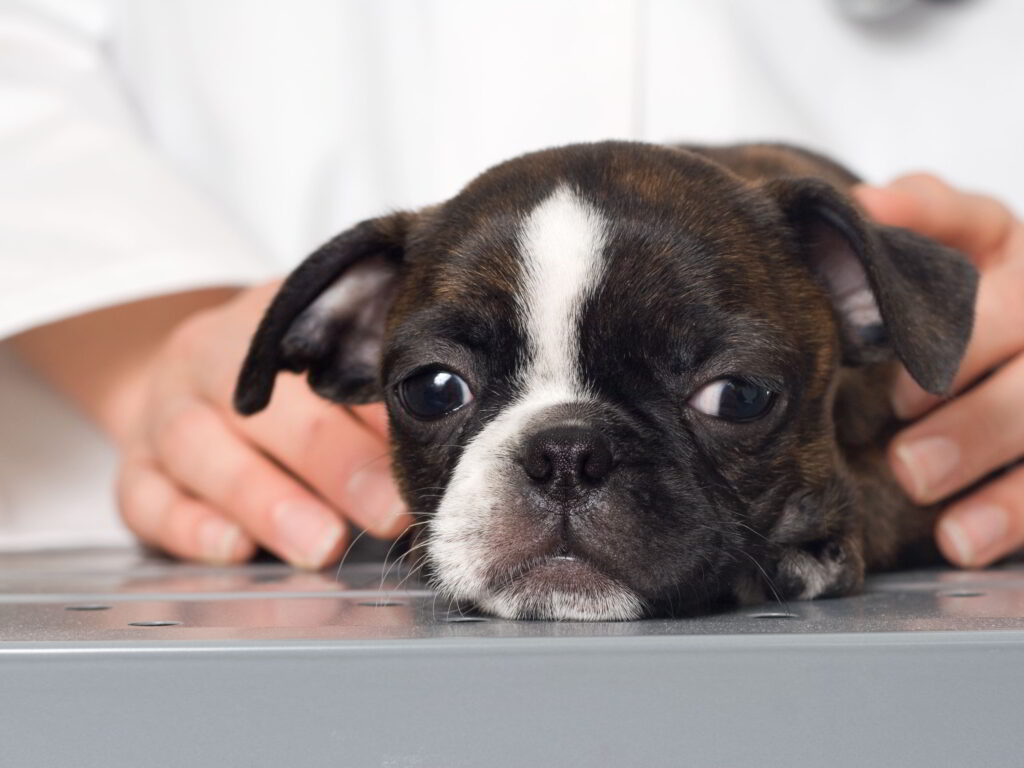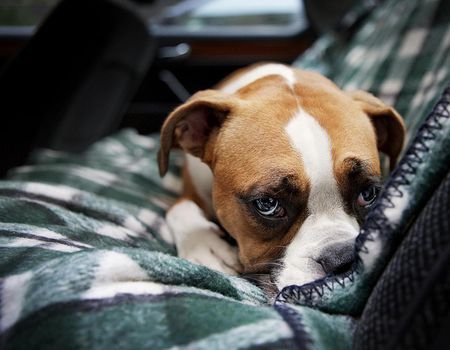Diarrhea is a common issue for puppies, so being familiar with dog diarrhea treatments is important for pet owners. Mild cases can be treated at home, but more severe cases of diarrhea can be deadly for puppies. While diarrhea isn’t a disease, it is a sign of illness, caused by many different conditions.
WARNING: Don’t wait to treat diarrhea-the resulting dehydration can make puppies even sicker. There are certain signs of diarrhea that require calling a veterinarian immediately, like waste looking black with a tar-like consistency, smelling extremely foul, containing large amounts of red blood, or being accompanied by symptoms like vomiting, severe abdominal pain, fever, appetite loss, or lethargy.
Why Do Puppies Get Diarrhea?
Diarrhea can be associated with viruses like parvovirus and distemper. It can also end up being due to intestinal parasites like whipworms and hookworms, protozoa like giardia, and bacteria like salmonella and E. coli. Some types of intestinal parasites can require several tests (over weeks) to obtain a diagnosis. Puppies can also develop diarrhea from a sudden new environmental change, like abrupt changes in diet, the stress of coming to a new home, being overfed, or from indiscriminate eating (like from the garbage or picking up items from outside).
Viruses and Infections
Puppies’ immune systems are not fully developed when they are very young and haven’t completed their full set of vaccines. This means they are generally more susceptible than adult dogs to bacterial or viral infections.
WARNING: Both forms of infection should be addressed immediately because they have the potential to be fatal. Common bacterial infections include salmonella and E. coli, but there are plenty of other bacteria that can infect your pet.
Viral infections such as parvovirus and distemper, as well as coronavirus , can infect an unvaccinated puppy and cause diarrhea, and all are dangerous. If your puppy is suffering from an infection there’s a good chance you’ll see additional symptoms such as fever, lethargy, and/or lack of appetite.
Parasites
Puppies can acquire some intestinal parasites such as roundworms and giardia from their mothers very soon after birth. They can also pick them up from the ground or infected water while outside. Most common intestinal parasites can be treated with the right medications from your vet, but some, if not treated, can become dangerous to your pet’s long-term health.
Diet
Puppies’ digestive systems are still developing, and some puppies may have sensitive stomachs or possess a hard time with particular brands or types of foods. Most will also respond poorly to a quick change in diet. A few have food allergies that can lead to diarrhea. Check with your vet to be sure the food you’ve selected is a good match for your puppy’s needs; there are many different types of food available, and one will certainly be right for your pet.

In addition to having sensitive digestive systems, puppies are also curious and may mouth or ingest almost anything they find interesting. This can include string, garbage, or virtually anything they find on the ground. In some cases, this can be dangerous; certain objects can cause intestinal blockages while others can be toxic.
Stress
If your puppy has just been separated from its mother and siblings, chances are it’s feeling some level of stress. Stress can be exacerbated by factors such as other pets in the house, unexpected sounds or smells, new foods, and new schedules. You can help your puppy overcome stress by providing a calm, predictable schedule, regular feedings and exercise, and plenty of affection.
Treatment
It’s always best to get a vet check first, but he or she may recommend that milder forms of diarrhea be treated at home. For instance, if it ends up being less than three days, your puppy still feels and acts well, and diarrhea has a pudding-like appearance, home care is usually appropriate.
Until you see the vet, however, withhold food (but never water) for 12 to 24 hours. This allows the gut to rest and gives the irritation a chance to heal. However, don’t withhold meals any longer than 24 hours without direction from your veterinarian. If your pet is reluctant to drink, offer ice cubes to lick.
Pepto-Bismol and Kaopectate may also help your pup. Make sure that water is always available for your puppy, as it’s very easy to quickly become dehydrated. Pedialyte or Gatorade half diluted with water can counter the dehydration as well. Plus, sudden watery diarrhea can spill huge amounts of fluid and important electrolytes out of the body. Use a needleless syringe or a turkey baster to squirt the medicine into his / her mouth. If appropriate for your pup’s situation, your vet will know the proper dosage.
It usually takes a couple of days for your puppy’s upset tummy to calm down, so a bland diet is suggested. Offer cooked plain white rice or plain, soft, cooked macaroni in a no-salt chicken broth. For more flavor, you can stir in a tablespoon of low-fat cottage cheese or plain yogurt. Yogurt contains beneficial bacteria that will help rebalance the disruption caused by diarrhea in your puppy. You may also try adding a little pumpkin flavor, as its high fiber content can assist with constipation or diarrhea, allowing the stool to normalize.

Prevention
The best thing you can do for your puppy is to make sure there is plenty of healthy and balanced food and exercise provided daily. New diets should be transitioned slowly when puppies are young. It’s possible that your puppy is getting into some spoiled food through the garbage can, so keeping those out of reach and being strict about not feeding your puppy any human food scraps is key. You will also want to stay current on your pup’s vaccinations, and check for any lingering parasites.
When it comes to your puppy’s environment, ensure that it’s stress-free. If your puppy is in a kennel with other pets, you’ll want to ensure that it’s clean and will be infected. Puppies are sensitive to their surroundings, so it’s helpful to stay on a regular routine for sleep, food, exercise, and walks. Another thing which will help is providing some weekly obedience training. On walks, you’ll want to keep an eye out for any plant or puddle consumption, as feces can be present which can lead to diarrhea. When you’re unable to supervise your dog, you may need to keep it kenneled to prevent any accidents.
